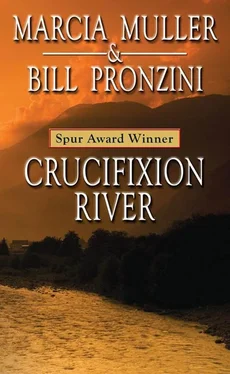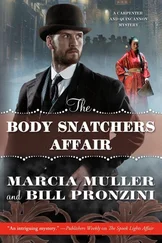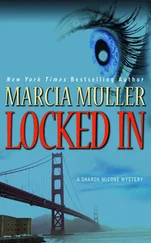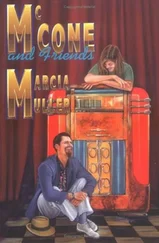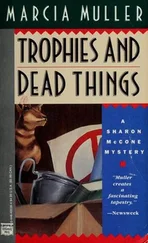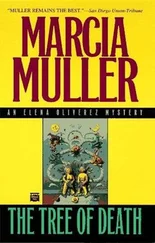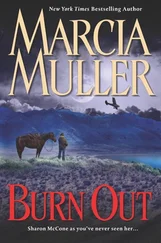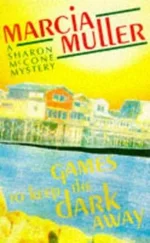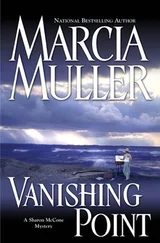Marcia Muller - Crucifixion River
Здесь есть возможность читать онлайн «Marcia Muller - Crucifixion River» весь текст электронной книги совершенно бесплатно (целиком полную версию без сокращений). В некоторых случаях можно слушать аудио, скачать через торрент в формате fb2 и присутствует краткое содержание. Жанр: Детектив, на английском языке. Описание произведения, (предисловие) а так же отзывы посетителей доступны на портале библиотеки ЛибКат.
- Название:Crucifixion River
- Автор:
- Жанр:
- Год:неизвестен
- ISBN:нет данных
- Рейтинг книги:4 / 5. Голосов: 1
-
Избранное:Добавить в избранное
- Отзывы:
-
Ваша оценка:
- 80
- 1
- 2
- 3
- 4
- 5
Crucifixion River: краткое содержание, описание и аннотация
Предлагаем к чтению аннотацию, описание, краткое содержание или предисловие (зависит от того, что написал сам автор книги «Crucifixion River»). Если вы не нашли необходимую информацию о книге — напишите в комментариях, мы постараемся отыскать её.
In this Spur Award-winning story, a Pinkerton detective, a couple on the run, a wanted man, and a traveling salesman with mysterious wares all converge on the banks of Crucifixion River to take shelter from an impending storm.
Crucifixion River — читать онлайн бесплатно полную книгу (весь текст) целиком
Ниже представлен текст книги, разбитый по страницам. Система сохранения места последней прочитанной страницы, позволяет с удобством читать онлайн бесплатно книгу «Crucifixion River», без необходимости каждый раз заново искать на чём Вы остановились. Поставьте закладку, и сможете в любой момент перейти на страницу, на которой закончили чтение.
Интервал:
Закладка:

Marcia Muller, Bill Pronzini
Crucifixion River
© 2007
End of the Road
“Are you going to send me back?”
No, I thought, I’m going to put a bullet in your silly head and dump your body in the slough. Be rid of one problem, at the least. I’d never killed a woman before, but there’s a first time for everything, and she was a burden I couldn’t bear. I eased back the tail of my coat.
“If you take me with you,” she said, “I’ll tell you how we can go on.”
“Go on? With this blasted tree blocking the road?”
“There’s a way around, another road intersects with this one about a mile farther south.”
“What road? You mean the one we passed a ways back?”
“Yes. It leads to Crucifixion River.”
“What’s that?”
“It’s…a kind of ghost camp.”
“Nobody lives there?”
“Nobody.”
“Easy to spot, this track?”
“It’s overgrown. But I know where it is…I can show you.”
“You’re not lying to me?”
“No! I swear it.”
I stared at her, long and hard. Her blue eyes were guileless. Some of my rage began to ease and I let the coattail fall closed. Her death sentence had been reprieved-for however long it took us to reach Crucifixion River.
Crucifixion River
T.J. Murdock
Bad storm making up. And moving in much faster than I’d expected.
You could tell it from the bruised look of the southwestern sky, the black-bellied cloud masses, the raw whip of the November wind. Already the muddy brown water of Twelve-Mile Slough-Crucifixion Slough to the locals-had roughened, creating wavelets that broke high against the muddy banks. The ferry barge, halfway across now, rocked and strained against the bridle looped over the taut guide cable. It took nearly all the strength I possessed to keep the windlass turning. If the storm broke with as much fury as I suspected it would, the crossing would be impassable well before nightfall.
The coming blow was a concern in more ways than one. Annabelle should have returned from River Bend an hour or more past. I hadn’t wanted her to go at all, but she had convinced Sophie to let her take the buckboard in for supplies. Seventeen now, no longer a child but not yet old enough to find her own way in the world. Headstrong, impulsive, chafing at the isolation of our lives here at the ferry and roadhouse. The trouble in Chicago was too many years ago for her to remember it clearly, and to her there was no longer any danger or any need for hiding. Perhaps she was right. But neither Sophie nor I believed it. Patrick Bellright had a long memory, and his hate for me would surely continue to burn hotly until the last breath left his body.
On the barge, the Fosters were having difficulty with the nervous mare hitched to their farm wagon. Harlan Foster waved an arm, asking me to hurry, but it couldn’t be done. The windlass creaked and groaned as it was, and the cable made sounds like a plucked banjo string as the barge inched along. At the rear of the Fosters’ wagon, Sophie stood, spraddle-legged, against the pitch and sway. It was days like this one that I worried most about her assisting with the ferry work. She was as capable as any man, but cables had been known to snap and ferries to capsize, passengers and crew alike to drown. We could not afford to hire a man for the job, and, even if we could, I was loath to take the risk of it. We had been safe here for eight years now, but safety is illusory. People are seldom completely safe no matter where they are. And fugitives from a madman…never.
The barge was nearing the Middle Island shore. Sophie signaled and made her way forward to lower the landing apron and attend to the mooring ropes. At her next signal, I locked the windlass and straightened, flexing the aching muscles across my back and shoulders. As Sophie tied the lines and the Fosters led their skittish mare off the barge, I turned to look up along the levee road. It was still empty, although the Sacramento stage was due from River Bend any time. But the stage was not what I was looking for.
What was keeping Annabelle?
Worry, worry. About the girl, about Sophie, about Patrick Bellright, about strangers, about the weather, about a hundred other things day after day. At times it seemed our lives were nothing but a plague of worry, leavened only occasionally by hopes and pleasures. If it weren’t for Sophie and Annabelle, and my writing, my life would be intolerably barren.
The wind gusted sharply, shushing in the cattails and blackberry vines and rattling the branches of the willows lining the slough. I could hear the clatter of the loose shingle on the roadhouse roof. I had been meaning to fix that, just one of the many chores that needed doing. The roadhouse, built of weathered boards reinforced with slabs of sheet metal, stood on solid ground and was solid enough itself, but the puncheon floor inside was warped in places and in need of new boards; there was painting to be done, and a new wood stove was fast becoming a necessity. Outside, the short wharf that extended into the brown water tested rickety and at least two of the pilings should be replaced. The livery barn was in good repair, except for the badly hung door and gaps in the south wall boarding. And now winter was nigh. Another rainy season like the last would keep repair work down to the minimum necessary for reasonable comfort and survival.
This California delta, fifty miles inland from San Francisco where the Sacramento and San Joaquin Rivers merged, was a vast network of waterways and islands linked by ferries and a few levee roads. Its rugged beauty and fertile soil drew farmers, ranchers, fishermen, shanty boaters, Chinese laborers, loners, eccentric groups of one type and another-and not a few fleeing from justice or injustice. But it was a harsh land, too, prone to bad weather and winter flooding. As many people as it attracted, it drove out in defeat and despair. The Crucifixion River sect, for one instance.
I shifted my gaze to the southwest, back along the levee road to where the peninsula extended into the broad reach of the Sacramento River. Stands of swamp oak, sycamores, and willows hid what was left of Crucifixion River, the settlement that had been built along the tip-more than a dozen board-and-batten shacks and a meeting house, crumbling now after seven years of abandoned neglect. The sect’s dream of a self-contained Utopian community that embraced religion and free love had died quickly, destroyed by the harsh elements and the continual harassment of intolerant locals. I held no brief for the sect’s beliefs, but I understood all too well their desire to be left alone to live their lives in peace, without fear.
I remembered the day they’d arrived from Sacramento, three score men and women and a handful of children in a procession of wagons. Everyone had been singing, their voices raised high and joyous:
We shall gather at the river, the beautiful, the beautiful ri-i-ver… .
I remembered the day they had left, too, less than two years later. That day there had been no singing. As I ferried them across the slough, the faces aboard the wagons were bleak and stoic against a cold gray sky. I wondered again, as I had many times, what had happened to them, if they’d found their Utopia elsewhere. I hoped they had.
The Fosters and their wagon were off-loaded now, and I could see Sophie waving as they clattered up to the Middle Island levee road. She threw off the mooring lines, raised and secured the apron. Even before she signaled, I had bent again to the windlass. The barge would be waiting here on the eastern shore when the stage arrived.
Читать дальшеИнтервал:
Закладка:
Похожие книги на «Crucifixion River»
Представляем Вашему вниманию похожие книги на «Crucifixion River» списком для выбора. Мы отобрали схожую по названию и смыслу литературу в надежде предоставить читателям больше вариантов отыскать новые, интересные, ещё непрочитанные произведения.
Обсуждение, отзывы о книге «Crucifixion River» и просто собственные мнения читателей. Оставьте ваши комментарии, напишите, что Вы думаете о произведении, его смысле или главных героях. Укажите что конкретно понравилось, а что нет, и почему Вы так считаете.
